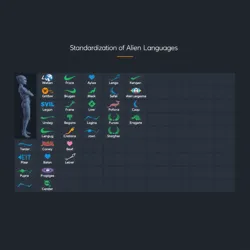Standardization Of Alien Languages
The Standardization of Alien Languages is an interdisciplinary effort aimed at creating a unified framework for understanding, documenting, and translating the myriad languages spoken by extraterrestrial species. This endeavor is crucial for fostering effective communication and collaboration across the galaxy, especially as interactions between human and alien civilizations become more frequent.
Background
The need for standardization arose alongside the increasing encounters with alien species, each possessing distinct modes of communication. Initial efforts were fragmented, with individual researchers and organizations attempting to decode and catalog languages independently. However, the formation of the Universal Language Symposium in 2217 marked a turning point, bringing together experts to establish a coherent strategy for language standardization.
Methodologies
The process of standardizing alien languages involves several key methodologies:
Linguistic Databases
Comprehensive linguistic databases are being established to store and analyze the phonetic, grammatical, and syntactic elements of alien languages. These databases, such as the Galactic Linguistic Repository, serve as vital resources for linguists and translators.
Translation Algorithms
Advancements in artificial intelligence have led to the development of sophisticated translation algorithms. These algorithms, like the Universal Translator Engine, are designed to convert alien languages into human languages and vice versa with high accuracy, facilitating smoother interspecies interactions.
Interstellar Sign Language
A standardized interstellar sign language is being developed to bridge language barriers in situations where verbal communication is impractical. This initiative draws inspiration from the Luminara and their non-verbal, light-based communication methods.
 An illustrative chart showing the complexity of various alien languages.
An illustrative chart showing the complexity of various alien languages.Challenges
Despite significant progress, several challenges remain:
- Cultural Sensitivity: Ensuring that the standardization process respects and preserves the cultural nuances embedded in alien languages is paramount. Efforts are being made to avoid linguistic imperialism and to promote cultural exchange rather than homogenization.
- Technological Limitations: While technologies like the Galactic Telepathy Array offer promising solutions, limitations in current technology still pose significant hurdles in achieving seamless communication.
Future Prospects
The future of alien language standardization is promising, with ongoing research addressing current challenges and expanding the capabilities of existing technologies. Collaborative projects initiated at the Universal Language Symposium continue to drive innovation and refine methodologies.
See Also
- Universal Language Symposium
- Galactic Linguistic Repository
- Universal Translator Engine
- Interstellar Dialogue: The Art of Alien Communication
- Cultural Exchange
The standardization of alien languages remains a cornerstone of interstellar diplomacy and cooperation, paving the way for a more interconnected and harmonious galaxy.